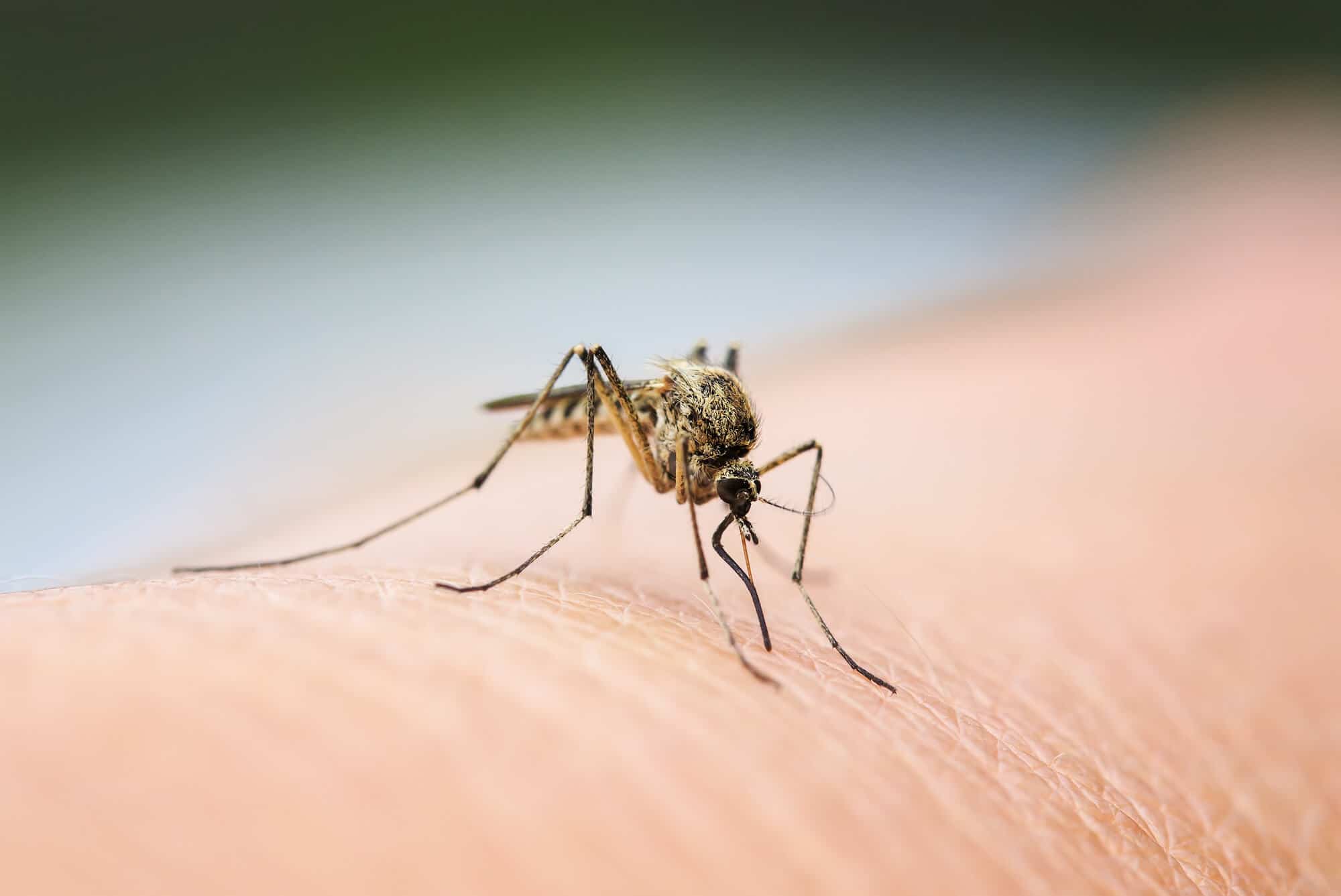How to Get Rid of Mosquitos in Your Yard
If you’ve ever had a mosquito buzzing in your ear while you’re trying to get a good night’s rest, you already know firsthand how annoying these pests can be. However, mosquitos aren’t just irritating—they can also be vectors for dangerous diseases and can cause allergic reactions in some populations.
Getting rid of mosquitos begins in your yard. Taking a few preventive steps can help save your family from a summer season of itchy bug bites and buzzing around your home. If you’ve noticed more mosquitos in your lawn, be sure to use one or more of these strategies to curb these pests.

What Are Mosquitos and Why Are They Dangerous?
Mosquitos are a type of winged insect that can be found all over the world. Female mosquitoes feed on the blood of humans and animals—if you’ve ever had an itchy mosquito bite, it means that a mosquito landed on you and drew a small amount of blood to feed. Mosquitos’ saliva contains a mixture of proteins that numb pain immediately while the mosquito is feeding. This is why most people cannot feel mosquito bites until that red, itchy bump forms a few days later.
Mosquito bites can cause a variety of health problems, including the following.
- Itchy bumps: A few days after you’re bitten by a mosquito, you’ll probably notice an itchy red bump on your body. Though these bites are annoying, they usually go away in one to two days. However, excessive scratching that breaks the skin can potentially cause the bite to become inflamed or infected.
- Allergic reactions: Some people are allergic to the proteins found in mosquito saliva. If you notice a large blister or hives appear on your skin after being bitten by a mosquito, you might be allergic. In some rare cases, a mosquito bite can also cause anaphylactic shock, which is a medical emergency that requires immediate treatment.
- Viral diseases: Mosquitos are known carriers of a wide variety of viral infections, ranging from the Zika virus to Malaria. Though most people assume that these illnesses are endemic only outside of the United States, more and more cases are being seen domestically as global ocean levels rise and mosquito populations become larger.
The average female mosquito lays up to 100 eggs at a time—and if even one mosquito decides to begin a colony on your property, you might be dealing with these uninvited guests all summer long. Thankfully, there are a few methods that you can do to deter mosquitoes from laying eggs on your property and kill existing mosquitoes and mosquito eggs already present in your lawn.
How to Get Rid of Mosquitos in Your Yard
There are a range of natural and chemical methods that you can use to repel mosquitoes from your lawn. Here are a few of our favorite remedies to try out this summer season.
Use chemical repellents
Applying a mosquito repellent designed to protect the exterior of your property can be an effective way to deter mosquitoes from making a home or laying eggs on your lawn. Outside repellents can provide you with up to eight weeks of protection from mosquitoes depending on the chemical used. Spray the exterior of your home, the perimeter of your property, and the area around any bodies of still water on your property to get the most out of your chemical treatment.
If you’ll only be spending a small amount of time in an area where mosquitos are common, you can also deter these pests by applying a chemical repellent to your skin. Chemical deterrents that contain ingredients like DEET, picaridin, IR3535, oil of lemon, and eucalyptus have all been found to be effective at deterring mosquitoes from biting. Be sure to only use repellents that have been approved by the Environmental Protection Agency (EPA) on your skin—do not apply standard exterior mosquito deterrents to your skin, as these chemicals are too harsh for direct contact. The effects of mosquito repellents containing DEET typically last around 12 hours. Experts recommend searching for a product that contains between 30% and 50% DEET for adults.
Use natural repellents
You can also use the following natural repellent methods in your lawn to deter mosquitoes.
- Plant natural deterrents: Certain types of flora and fauna act as natural mosquito repellents—and they look great in your lawn as well. Consider planting sage, lavender, lemongrass, marigolds, or peppermint in your yard to create a natural barrier.
- Attract predators: Mosquitos have a wide range of natural predators, including spiders, birds, and bats. Though natural predators cannot completely eliminate a mosquito problem in your lawn, they can add a bit of natural beauty to your yard while also curbing the mosquito population without the use of chemicals. Setting up bird feeders and bat houses on your property can attract animals that will feed on the mosquitos. If you have a pond in your lawn, you may want to introduce goldfish, red-eared slider turtles, and koi to the water to help weed out mosquitoes.
- Use cedar mulching: Cedar oil is one of the most popular natural mosquito repellents. Applying cedar mulching to your lawn and garden can keep mosquitoes away while also keeping your plants well hydrated and insulated throughout the summer season.
Customize your outdoor space
If you have a localized area of your lawn that you want to keep mosquitos away from, consider these customization options that will keep your property more comfortable while also fighting pests.
- Add mosquito netting: If you have a gazebo or porch that you want to keep mosquitoes away from, mosquito netting can provide an effective and affordable barrier for localized areas. If you’re a camper, you can even repurpose old mosquito netting to become a permanent fixture in your lawn.
- Use yellow LED lights for your home’s exterior: Mosquitoes are attracted to the blue-white light thrown off by traditional bulbs. Consider installing yellow LED lights in your home’s security system and outdoor lighting to deter mosquitoes from your property.
- Install an oscillating fan: Mosquitoes aren’t very good at flying where there’s wind. You can create artificial wind around your deck or patio by installing an oscillating fan outdoors. Be sure that the fan you invest in has enough power to cover the entirety of the outdoor space you’re protecting.
- Light a few candles: Citronella candles are sold at most nurseries and gardening centers and are a long-time favorite for deterring mosquitoes. Stake a few citronella torches around your property to keep mosquitoes away.
Drain still water as often as possible
Still water on your property is one of the biggest risk factors for developing a mosquito problem because mosquitoes lay their eggs on water. Reducing or eliminating still water on your property is the first step to permanently sending mosquitoes away from your home.
At the end of every day, take a walk around your property and dump out any still water. Mosquitoes don’t need an entire pool or pond to lay their eggs in—even a pet’s dish can provide a hospitable area where mosquitoes can multiply. Empty bird baths, children’s toys, and plant saucers as well. Mosquito eggs only need 48 hours to hatch, so you should make dumping out still water and refilling it with fresh water a daily chore. If possible, flip over items that tend to collect water overnight so they won’t fill up again if it rains before you add new water in the morning.
You should also drain your gutters each year and be sure that they’re diverting water away from your home properly. Over the winter, your gutters might fill with snow, which can then become still water in the spring. Check your gutters after the last snow of the season and be sure that they aren’t full of leaves or other debris that can cause clogs.
Treat the water you cannot drain
If you have a pool or pond on your property, it’s probably not possible to drain your water each night. Use these strategies to treat still water on your lawn so mosquitoes can’t lay eggs in it.
- Balance your pool’s chlorine levels: During seasons when your pool is in use, be sure to check the water’s chemical levels regularly. At the end of the day, ensure that the tarp is sealed tightly over the water. Drain your pool as soon as the season is over and seal it as effectively as possible to ensure that water cannot pool during the off-season.
- Change fountain filters regularly: If you have a fountain on your property, be sure to change the filter as soon as it becomes dirty to deter mosquitoes from laying their eggs there. If the filter becomes too clogged, it can cause the water to become still.
- Invest in mosquito dunks: A mosquito dunk is a small cylinder that releases a bacterium called bacillus thuringiensis that kills mosquito larvae. These bacteria only harms mosquito eggs—it won’t injure or kill birds, fish, or turtles. This means that mosquito dunks can provide you with a safe way to prevent mosquitoes from laying eggs on your fishpond without installing a filter.
Keep your property clean and clear
Mosquitoes are attracted to areas that provide them with a cool, dark, and damp place to lay their eggs and feed. Taking some time to update your lawn maintenance schedule for the summer season can do wonders when it comes to deterring mosquitoes. Ensure that your lawn is mowed consistently, trim trees and shrubbery throughout the year, and prevent puddles of rainwater from accumulating on your grass to make your property less appealing to mosquitoes.
You should also clear out trash and unnecessary junk from your property, as these items can often provide mosquitoes with sneaky hiding places that store still water. Old tires are a particularly notorious culprit, providing mosquitoes with warm shelter and a damp environment they can use to lay their eggs. Clean out your lawn as frequently as possible to eliminate all hiding spots you might have in your yard.
Calling in the Experts
For some stubborn mosquito problems, the best solution is to call in the experts at TruGreen. TruGreen is a professional lawn care service provider dedicated to providing homeowners across the country with the comprehensive set of services they need to keep their lawns looking lush and healthy throughout the year. From applying pre-emergent treatments to protecting the exterior of your property, TruGreen’s team has the skills and tools to tackle even the toughest mosquito infestation.
To learn more about TruGreen, give our team a call today at 877-349-9084.







